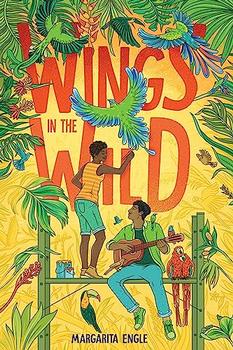Summary | Excerpt | Reading Guide | Reviews | Beyond the book | Read-Alikes | Genres & Themes | Author Bio

Margarita Engle's wonderful young adult novel Wings in the Wild is dedicated to "los caminantes cubanos y los costarricenses generosos," which translates to "the Cuban walkers and the generous Costa Ricans." She also dedicates it to "[the] tree planters and wing dreamers everywhere." The book's two protagonists are Dariel, the "Song-Boy" and Soleida, the "Tocororo-Girl," tocororo being the Spanish name for the Cuban trogon, Cuba's national bird.
Sixteen-year-old Soleida is the daughter of dissident Cuban artists, who secretly sculpt statues of winged beings into the trees of their garden. A muse for her parents and artistically expressive herself, Soleida rescues birds and snails, is raised on tales of the indigenous Taíno bird-girl legend, and dreams of a freedom she and her family have never known. When a hurricane rips away their home and exposes the forbidden artwork, Soleida and her parents are forced to flee. "Which country will accept us?" Soleida asks. "Hardly any nation in the world/grants visitors' visas to Cubans/because they're afraid/we'll stay."
The son of successful second-generation Cuban immigrants, Dariel lives in drought-ridden California. As a musician, he has an uncanny ability to attract birds and animals whenever he plays his guitar and sings in the old Cuban style known as filin, which his Abuelo (Grandfather) says is the Taíno gift of storytelling. After a forest fire which destroys his family home along with the surrounding woodland, Dariel rages against inaction in the face of climate change. His Abuelo is writing a book about Cuban walkers: refugees who fly from Cuba to South America, walk across the land, and get stranded in jungle camps in Costa Rica, on the border of Nicaragua, which refuses to allow them entry. Dariel goes to Costa Rica to help interview caminantes and there, in a border zone camp, he meets a "bald, silent, traumatized girl" named Soleida.
As Soleida's and Dariel's stories come together, two of the world's most urgent crises, refugees and climate change, merge to form the heart of this compelling and captivating book. Written entirely in heartfelt, crystal-clear verse, the book takes the reader on a powerful emotional journey with these two young people, who, despite the traumas and violence of their experiences, find strength and hope within themselves, joy and solace in their blossoming love for each other, and ingenuity and purpose in their determination to restore the beauty of the natural world being destroyed around them. Through their keen eyes and poetic words, Wings in the Wild retains a remarkable balance of darkness and light, never losing sight of hope in the wake of tragedy and loss. While the book does not shy away from the cruelty and horror of tyranny and the appalling treatment of refugees, it also affirms the kindness, empathy, and generosity of spirit among exiled communities and those who grant them sanctuary.
The glorious, brightly-colored wildlife of Cuba and Central America is vividly evoked with dazzling descriptions and potent imagery. Art, music, history, tradition, migration, exile, and environmental issues are all interwoven in the story, reflective of an ecosystem and pattern in which all unite to form a beautiful, cohesive whole. Wings in the Wild is a terrific read, stressing that the urgency of the problems facing our planet are as personal as they are global, and that individuals and a new generation can do a great deal to address them. Soleida and Dariel are tremendously sympathetic conveyors of this message, and their story should prove enthralling and inspirational.
![]() This review was originally published in The BookBrowse Review in May 2023, and has been updated for the
May 2024 edition.
Click here to go to this issue.
This review was originally published in The BookBrowse Review in May 2023, and has been updated for the
May 2024 edition.
Click here to go to this issue.

If you liked Wings in the Wild, try these:

by Randy Ribay
Published 2024
From the author of the National Book Award finalist Patron Saints of Nothing comes an emotionally charged, moving novel about four generations of Filipino American boys grappling with identity, masculinity, and their fraught father-son relationships.

by Ondjaki, Lyn Miller-Lachmann
Published 2024
A blackout leads two teens to discover the intimacy and vulnerability that can only be shared in darkness in Our Beautiful Darkness, a fully illustrated YA novella from celebrated Angolan author Ondjaki and illustrator António Jorge Gonçalves.
Finishing second in the Olympics gets you silver. Finishing second in politics gets you oblivion.
Click Here to find out who said this, as well as discovering other famous literary quotes!
Your guide toexceptional books
BookBrowse seeks out and recommends the best in contemporary fiction and nonfiction—books that not only engage and entertain but also deepen our understanding of ourselves and the world around us.